Don Dines in Athens: Tzimis, Vyronas
Beyond souvlaki lies a carnivore’s paradise,...
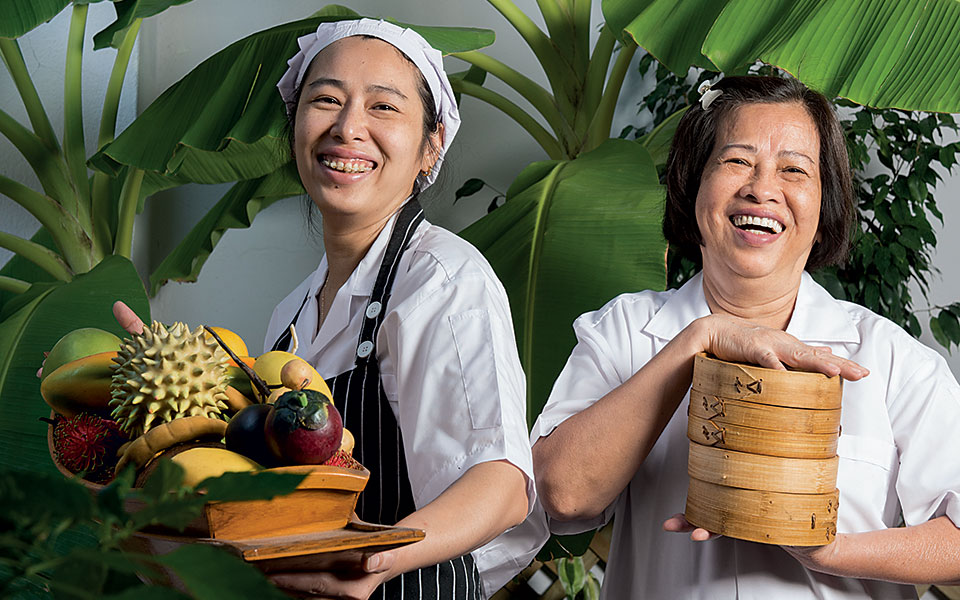
Rouan Thai
© Angelos Giotopoulos
Thailand in Piraeus
There’s a love story behind the Thai restaurant in Piraeus. The story starts back in the 1980s, when Babis, an engineer in the merchant navy, landed in Thailand and fell in love with Noi (who has since been baptized as Marina). They got married, moved to Greece and opened Rouan Thai in 2005.
Noi’s daughter Nok (meaning “little bird”) came over from Thailand later to take over in the kitchen. If you’re not sure what to order, just tell the waiter you want numbers 81, 85 and 99. Those are the fried pork with garlic and pepper, the tom yum goong shrimp soup and the spicy sweet red curry with beef, coconut milk and peppers.
The menu includes several Chinese dishes; the restaurant caters to workers from the Cosco cargo terminal, as well as Asian sailors from cruise ship crews that visit the port. On the other hand, princes and ambassadors have eaten here, too.
We also recommend the pad thai, the papaya and peanut salad, and the green curry soup with shrimps and bamboo shoots, if you like heat. There’s a selection of Thai beers to quench the fire. The service is warm and friendly.
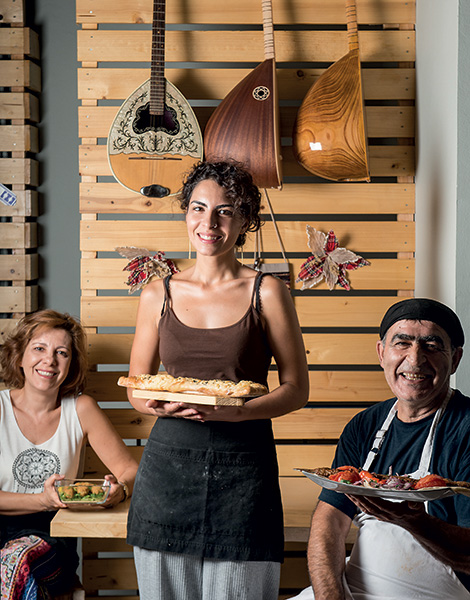
Hayat
© Angelos Giotopoulos
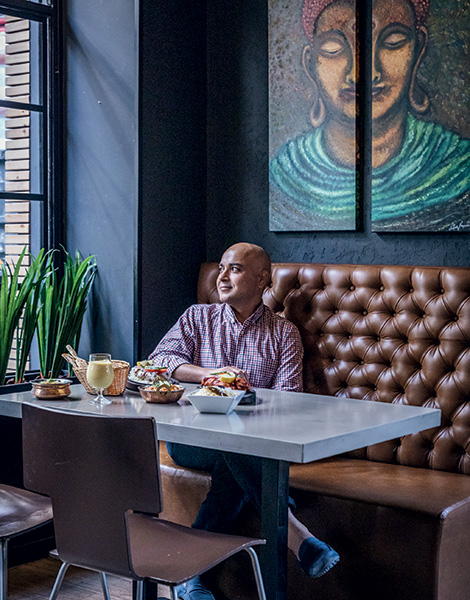
Namaste
© Alexandros Antoniadis
Kurdish from Scratch
Seyit Aldogan came to Athens in 1986 as a political refugee from southeastern Turkey. Everyone in his family cooked, the men even more than the women, so it wasn’t surprising when he decided to open an authentic Kurdish restaurant with his wife Vaso in the downtown Exarchia district three years ago.
Everything on the menu is made from scratch. Fluffy buns are brought to the table toasted and lightly buttered, along with peinirli (boat-shaped pizzas) and pastourmas pie, all handmade.
The kitchen is open, allowing you to see your order being made, the pasta prepared by hand and the minced meat being put onto the spit for the kebab. The owners’ daughter Antigone helps her parents prepare kebabs, lahmajoun, icli kofte stuffed meatballs, manti dumplings and other delicacies that taste of Seyit’s homeland.
Curry under the Acropolis
Krishna (Kris) Pokharel was born and raised in Nepal. He came to Greece after meeting the Greek woman who would become his wife when she was on a visit to his country. “In Nepal, entertainment means going out for a meal, usually to the home of a friend or a relative, meaning something intimate,” he says. Given the importance of home-cooked food in Nepalese culture, it’s hardly surprising that Kris learned to cook from a very young age, and that he loves it, too. Eventually, his friends implored him to open a restaurant.
While the Indian food available in Athens tends to be disappointing, Namaste’s fresh, fragrant, spicy and completely authentic dishes are a world apart. His salads are rich bouquets, with refreshing notes of coconut and mango, and his marinades are incredibly complex.
Cooked in a proper tandoor oven, the chicken korma, a definite menu highlight, is succulent and delicious, thanks to a marinade of cashews and coconut milk. A small bowl of cooling raita or a glass of mango lassi is just the thing to soothe the more sensitive palates.
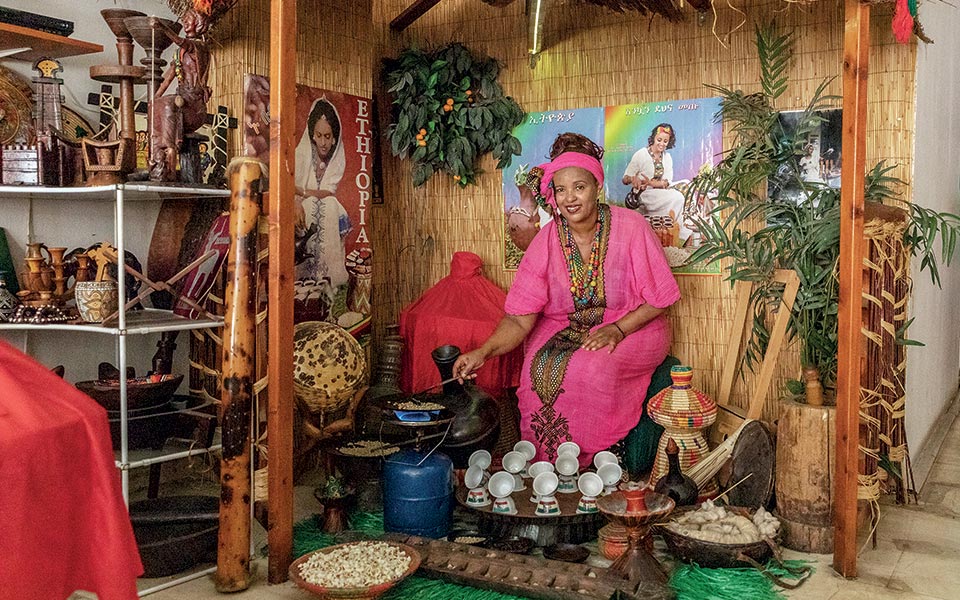
Lalibela
© Alexandros Antoniadis
The Sisters from Addis Ababa
Elisabeth and Tsehay Taddasse have been serving the food of their native Ethiopia at their Kypseli restaurant for the past 19 years. There’s a tent inside the restaurant, under which Elisabeth prepares coffee in the traditional way. In an almost religious ritual, she roasts the beans before grinding them in a mortar and brewing the coffee, with the scent of burning incense in the air – just as back home. All the food is served with injera, a flatbread that replaces cutlery and is used to scoop up mouthfuls of chicken, lamb, beef, rice and vegetables.
The dishes are richly seasoned and spiced. The doro wat, for example, is made of chicken cooked with chili, eggs and spicy butter; in Ethiopia, it’s a festive dish served at Easter. Lalibela is a no-frills restaurant but retains its ethnic charm, thanks to Elisabeth’s artwork and the indoor coffee tent. There’s a buffet of 15 traditional dishes every first Saturday of the month.
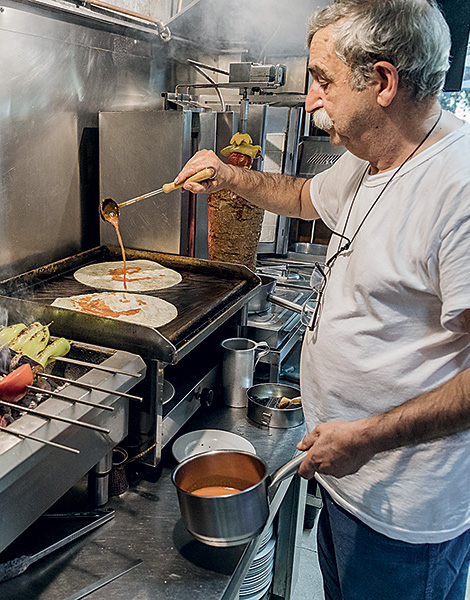
Mikra Asia
© Alexandros Antoniadis
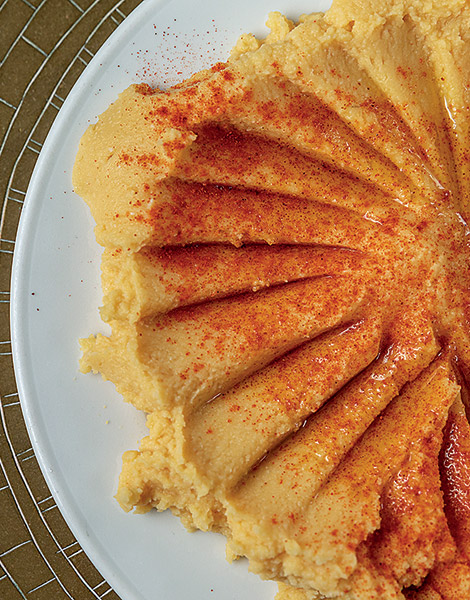
Association of Greeks from Egypt
© Alexandros Antoniadis
Major Flavor from Asia Minor
Medical school graduate Sinan and his wife Cicek are Kurdish political refugees from Turkey. Thirty years ago, they fled to Greece, where the political situation was better and they had friends who told them that they would fit in. They opened a kebab restaurant on downtown Amerikis Square a decade after their arrival, and now their daughter, Olga, has opened her own branch in the Pangrati neighborhood. The food at both is delicious and completely authentic.
The doner is an enjoyable experience, made by hand and comprising layers of veal fillet and freshly ground beef. The most popular item on the menu is the beyti kebab, wrapped in a crepe-thin pita and accompanied by roasted tomato and buttery rice with chickpeas. The giaourtlou kebab is also very good, as are the ajem pilaf and the hunkiar, a veal and eggplant dish, prepared by prior arrangement as it takes several hours to make them. For dessert, the kanafeh is made in-house.
20 Moschonision, Amerikis Square, Tel. (+30) 210.864.4698 2 Messolongiou Square, Pangrati, Tel. (+30) 210.330.0733
Serving the Community
Hidden away in a huge, sun-filled space on the first floor of an ordinary Athenian apartment building on Tritis (3is) Septemvriou Street, the award-winning Association of Greeks from Egypt is an oasis of calm, cleanliness and wonderful aromas in a rather dingy and noisy part of the city. It was founded in 1933 by a group of Egyptian-Greek students who were studying in Greece (later, it fed students trapped far from their families during the WWII occupation of Athens) and became a lively social and cultural hub. It still hosts cultural events and provides food and support to some 100 Greek-Egyptian families in need.
Chef Magdi Shahin makes classics like fried kibbeh and an amazing rice dish with ground beef and cashews. The Greeks from Egypt who come here love the amazing molokhia soup, the fava beans done all sorts of ways, the kofta and the hummus.
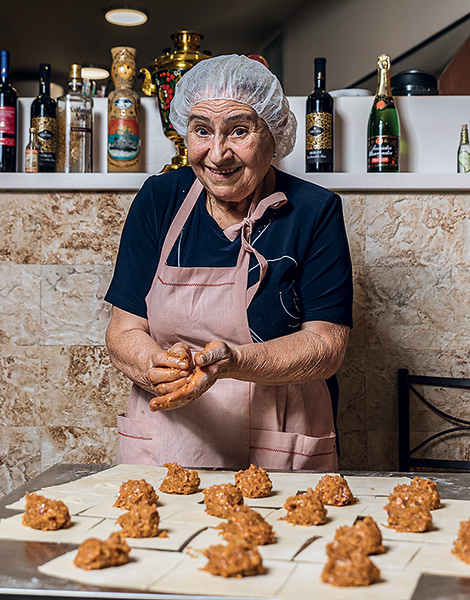
Valentina
© Alexandros Antoniadis
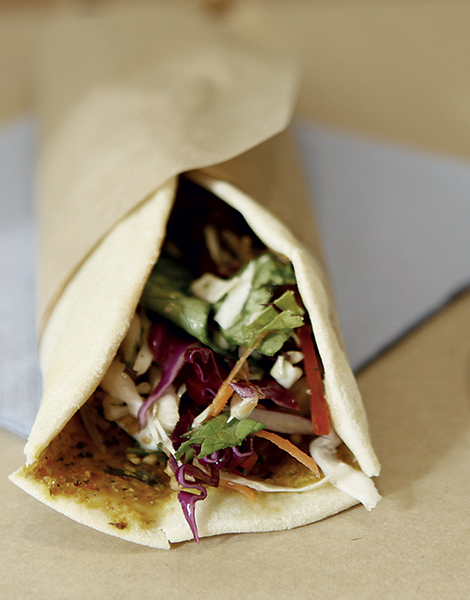
Feyrouz
© Alexandros Antoniadis
Rolling in Russian Dough
Valentina Triantafyllidou hails from Kazakhstan, born into a family with Greek roots in Trabzon in Turkey on the Black Sea. She has run one of the best restaurants in Greece for the past 31 years. The 76-year-old is still going strong, working on all the dishes on the menu, and she’s also enlisted the help of her son Dimitris and of one of her eight grandchildren, Antonis. It’s a joy to watch her deftly wrapping the small stuffed pelmeni dumplings and giving them the perfect shape.
Valentina insists that her food transcends borders. “I make Pontic manti but I add yoghurt, as well as pelmeni and pierogi stuffed with cheese, which are Russian,” she says. There’s also kebab and the famous melt-in-your-mouth Uzbek skewered meat known as shashlik – get the lamb instead of the pork; it’s marinated in a secret sauce for hours and served with a sprinkling of white vinegar. There are also homemade sauces and vegetable dips you can smear on lepyoshka buns, and piroshki stuffed with ground beef, potato or cheese.
Valentina
235 Lykourgou, Kallithea, Tel. (+30) 210.943.1871
From Antioch with Love
The entire Feyrouz family – Eleni, her sons Andreas and Savvas, and her husband Stavros – can often be seen working away in the kitchen and behind the counters. It’s easy to spot them; they’re usually the ones humming along to one of the traditional tunes playing on the stereo.
Surprises on the menu here include the tasty lahmajoun with meat or vegetables. Try pies with different fillings, such as the one with beans cooked in tomato sauce and feta. By the end of the lunch service, the huge pot of rice with chickpeas and spice-rich chicken has invariably sold out; the makhlouta soup is also an all-year favorite.
The family also runs the Feyrouz sweet shop across the street, serving kanafeh, an unusual baklava made with very good pistachio nuts; a modern version of the syrupy sekerpare; and a delightful kazandibi milk pudding. The coffee is brewed on hot sand and made from top-quality beans.
A version of this article was published in the October issue of the food magazine “Gastronomos.”
Beyond souvlaki lies a carnivore’s paradise,...
The signature dish of the island...
Discover how Christos, Athens’ master souvlaki...
Souvlaki joints started appearing in earnest...